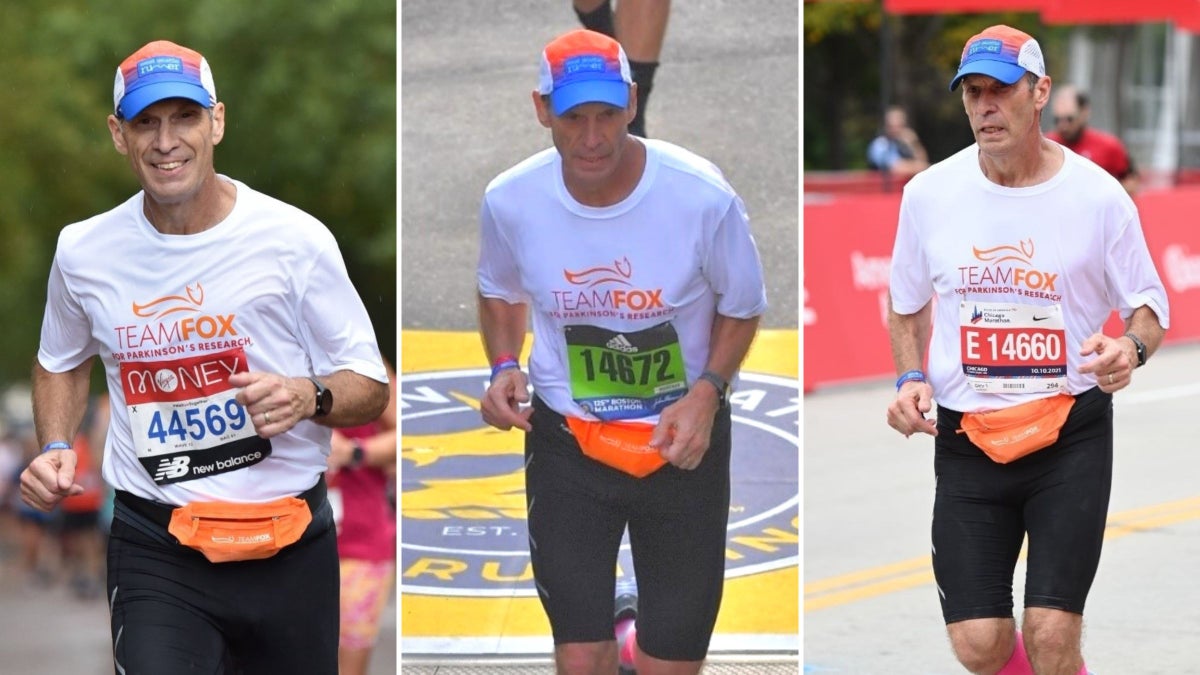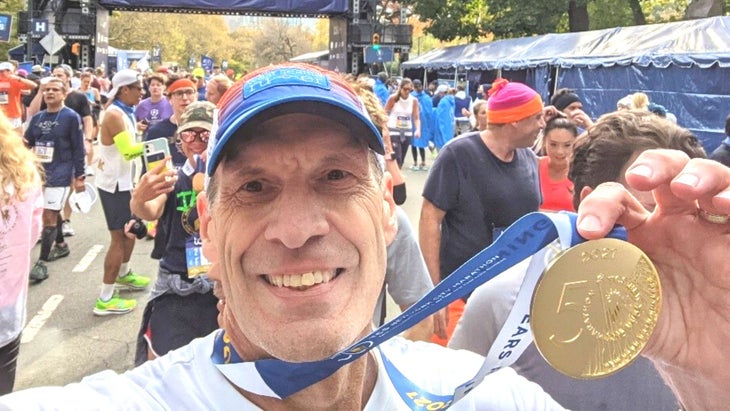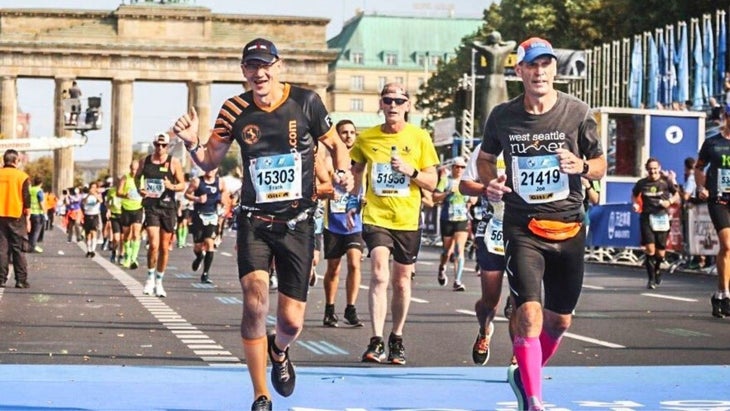
On Sunday, November 6, Joe Drake will run his 15th marathon since first giving the distance a go in 2019. The 26.2 miles he’ll run through all five boroughs of New York City come only four weeks after he ran the Chicago Marathon on October 9.
But that short recovery period is nothing compared to his 2021 racing season. Last year, Drake racked up six marathons in seven weeks, when he ran all the World Marathon Majors (WMM) consecutively (The Tokyo Marathon was canceled, so he ran that one virtually in Seattle, where he lives with his wife).
Due to circumstances surrounding the pandemic, the 2021 WMM spring races were postponed to fall, presenting an unprecedented chance to run Berlin, London, Chicago, Boston, Tokyo, and New York consecutively. The opportunity seemed historic. “This is a thing that–hopefully–no one will ever get a chance to do again,” says Drake. “So why not?”
He made it through, framing the first five marathons in his mind as just another long run in his training. “Then you only really train for the last one,” he says.

Running as Medicine
Drake’s relatively new penchant for marathoning might seem extreme, but since retiring the same year as he was diagnosed, training (and experimenting with training) has been a rewarding way to fill his new wealth of time. Even after tackling a lot of miles in 2021, and dabbling into relay racing with the 208-mile Blue Ridge Relay earlier this year, you won’t see Drake slowing down with his hobby anytime soon.
That’s because it’s more than just a hobby. Running is his medicine.
Just before retiring from his job as an engineer, Drake was diagnosed with Parkinson’s Disease (PD). The neurodegenerative disease is progressive, with symptoms that affect motor function and non-motor related symptoms that can affect mental health, energy, and concentration.
“Before I was diagnosed, I was tripping and falling sometimes,” says Drake. As a lifelong soccer player, he noticed he was struggling to make routine plays. He developed a hand tremor.
Running keeps Drake’s symptoms at bay and significantly slows the progression of the disease. “Even training for that first marathon, I was surprised that the symptoms had gone away,” he says. For Drake, PD medication makes it possible to have the energy and baseline to do the amount of exercise needed to slow the disease progression.
The Promising Science Exploring Parkinson’s and Exercise
According to the Parkinson’s Foundation, a minimum of 2.5 hours of exercise per week – especially when started early on – can help a person with PD maintain and improve mobility, flexibility, and balance. Movement is also proven to be beneficial in stabilizing mood, which is essential as PD impacts the areas of the brain that produce dopamine, serotonin, and norepinephrine.
Scientists have known for a while that exercise is extremely beneficial for people with PD, but narrowing down why has been a challenge. Research published in August in the Proceedings of the National Academy of Sciences looked specifically at the hormone irisin, which is secreted into the blood during aerobic exercise. The researchers tested the hormone on mice that had Parkinson’s or similar symptoms by injecting a viral vector which increased levels of irisin. After six months, the mice who received the injection had no mobility deficits, while the control group did.
“It was very effective,” says Dr. Ted Dawson, co-author of the study and director of the Institute for Cell Engineering at Johns Hopkins. Dr. Dawson notes that the intervention was very early on in the disease progression in the mice. “One of the things we would like to do is even start it later when the disease is much more entrenched, and see whether it has beneficial effects,” he says.
Though the findings with irisin are promising, Dr. Dawson notes that it’s probably just one piece of the puzzle when it comes to exercise’s effects on PD. “It’s very likely muscle would secrete other peptides from endurance exercise. The beneficial effects of exercise on overall wellbeing and metabolic effects probably also account for the benefit of exercise,” he says.
Whatever the reason, Drake knows that, without a doubt, endurance training improves his quality of life in more ways than he could have imagined.

Community, Running and Parkinson’s Disease
Through marathoning, Drake has been invited into a community of other people affected by PD, too, while running for the Michael J. Fox Foundation’s Team Fox. “I’ve seen people with Parkinson’s all over thriving, despite the disease,” he says. And though everyone is different, he wants people to know “you can still lead a very active and rich life,” with Parkinson’s Disease.
In September Drake released his memoir, Run With It: A True Story of Parkinson’s, Marathons, the Pandemic, and Love, complete with a cover illustrated by his sister who also has PD. His diagnosis has brought him closer to her, as well as another brother who also shares the diagnosis to whom he had hardly spoken for 40 years. “Now, whenever I go visit the family on the East Coast, I always stay with him. He gets a bicycle ready for me. We go on a long bike ride together. We cook meals together. My wife and I stay at his house. I have Parkinson’s to thank for that reconciliation,” says Drake.
So no, Drake isn’t going to stop running anytime soon. He’s hanging on for the cure. “My personal feeling is that I want more people who are afflicted with the disease to understand that, if you do the exercise, you can slow the progression of the disease, so you’re in that much better shape when the cure comes.”
And besides, he still wants to get that real Tokyo Marathon medal.
The post “I’d Like to Think of Parkinson’s as my Superpower” appeared first on Outside Online.
by mmitchell via Outside Online
Comments